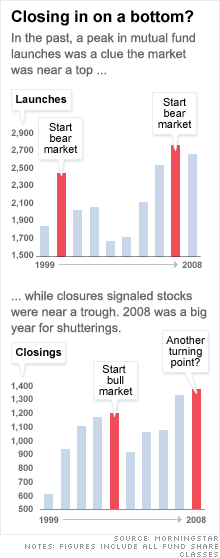Topsy-turvy times for mutual funds
Beware of the turmoil in the fund industry. In the end it's always you who pays the price.

(Money Magazine) -- If you're a mutual fund investor, the damage from the financial crisis is easy enough to measure: The typical blue-chip stock fund, for example, is down 34% over the past year.
What may be less obvious to you is the trouble the crisis has caused fund companies - and what that means for your portfolio. After two decades of booming growth, the fund industry is going through its own meltdown. Long-term assets held by fund companies plunged 37% between October 2007 (when the bear market started) and the end of last year. The result: a wave of budget cutting and consolidation.
Major fund groups including Fidelity, Oppenheimer, and Alliance Bernstein have laid off staff. And industry watchers are bracing for several fund companies to be sold. Why should you care? Because fund problems have a way of becoming shareholder problems. Here are three things to watch out for.
The number of funds that have been liquidated or merged has spiked recently. And Lipper's Jonathan Kreider says, "We're likely to see even more consolidations this year."
Blame it on the lousy market. Funds with poor track records are often merged into stronger ones. Also, funds are sometimes eliminated when assets fall too low to generate profits for the firm - typically $100 million is the breakeven point.
While a big bump in fund closures can be a sign the market is nearing a bottom (see the chart), it can still throw a wrench in your portfolio.
For instance, your middle-of-the-road blue-chip stock fund could get merged into a more aggressive portfolio. So keep an eye on your fund's size and style. Use our fund screener. Also, start scouting for a backup in case your fund falls below $100 million.
A slew of fund families, including Janus, Putnam, and MFS, recently replaced managers. Even legendary value investor David Dreman was shown the door at DWS High Return Equity, a fund he launched in 1988. If your manager gets the boot, look closely at the replacement. Make sure the new manager not only has a good track record, but invests with the same strategy. If not, move to a new fund.
Morningstar predicts fees for stock funds are likely to rise. Even Vanguard, the low-cost champion, says the expense ratio for its Vanguard U.S. Value fund is expected to jump from 0.37% to 0.46% this year.
What to do? If your fund's costs were above average to start with, shift to a cheaper option. But if your fees are still lower than average, sit tight. Chances are, expenses will fall when the market recovers.
Dealing with an issue that affects your offspring and your money? Let us know about it at money_letters@moneymail.com. ![]()


